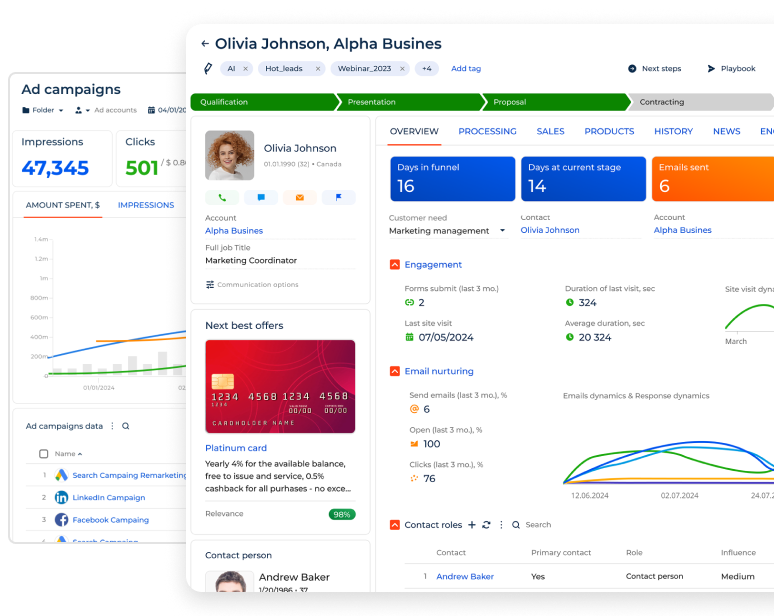-
No-Code
Platform
-
Studio
No-code agentic platform delivering the fastest time-to-value and the highest ROI
-
Studio
-
AI-Native CRM
CRM
-
AI-Native CRM
New era CRM to manage customer & operational workflows
CRM Products -
AI-Native CRM
- Industries
- Customers
- Partners
- About
Customizable CRM: 10 Best CRM Recommendations in 2026 [Updated]
Updated on
November 21, 2025
19 min read
Creatio CRM: One Platform, Endless Possibilities

For many businesses, CRM platforms can feel more like a burden than a solution. Teams can often struggle with challenges like confusing interfaces, clunky add-ons, and low adoption rates, that slow productivity instead of improving it.
In 2026, organizations are looking for customizable CRM software that adapts quickly to their unique needs. Unlike rigid, legacy systems, a customizable CRM platform empowers businesses to design processes, tailor workflows, and fully leverage CRM capabilities within their industry.
In this article, we’ll explain everything you need to know about customizable CRMs: what they are and why they matter, their key features and benefits, and the top 10 most popular customizable solutions to consider today.
Key Takeaways:
- Customizable CRM allows businesses to adapt core functionality to their specific processes and industry needs. Unlike a fully custom-built CRM, it’s a ready-to-use platform that can be tailored with no-code tools, composable architecture, integrations, and AI features — without heavy development effort.
- Customizable CRM platforms are primarily used by organizations that prioritize flexibility and manage a large number of complex processes and workflows, most often midsize to large companies in finance, healthcare, manufacturing, and other industries.
- The best customizable CRMs in 2026 to consider are Creatio, Salesforce, Pipedrive, Monday.com, Zendesk, Zoho, ClickUp, HubSpot Smart CRM, Copper, and Nimble.
What is Customizable CRM?
A customizable CRM is a ready-to-use customer relationship management platform that that can be tailored to fit specific processes, workflows, and industry requirements. These systems enable businesses to modify CRM appearance and features, tailor data fields, create unique dashboards, automate role-specific tasks, and integrate with other business tools and systems. By configuring their CRM, organizations can boost adoption, improve operational performance, and drive higher ROI.
Unlike rigid CRMs that lock companies into predefined workflows, customizable CRM software adapts to the business itself. For instance, it can power role-specific dashboards in finance, align workflows with multi-stage supply chains in manufacturing, or provide compliance-ready data fields in healthcare. For enterprises with complex operations, this adaptability is mission-critical, helping stay more efficient, compliant, and competitive.
Customizable CRM vs Custom CRM: What is the Difference?
Although the terms sound similar, the difference between a Custom CRM and a Customizable CRM lies in how the software is built and implemented:
- A custom CRM refers to the unique platform created from the ground up to fully match company’s requirements. It's mostly developed by large enterprises with very specific, niche requirements and big development budgets.
- A customizable CRM is a pre-built CRM solution, like Creatio or Pipedrive, that allows business users to configure certain aspects of the system without changing its core structure. It provides flexibility in settings, layouts, and configurations to adapt to diverse business needs. Customizable CRMs can be deployed by any organization seeking flexibility, faster deployment, and continuous adaptability.
5 Main Benefits of CRM Customization
CRM customization ensures the platform’s functionality aligns with the specific needs of every business user. The most important benefits include:
- #1. Meeting specific business needs: The customizable CRM adapts to unique processes and requirements.
- #2. Enhanced productivity and adoption: Customizable CRMs seamlessly fits into daily workflows, making it easier for teams to use effectively.
- #3. Tailored analytics: Customized software focuses on providing only relevant analytics and insights, preventing information overload.
- #4. Seamless scalability: These CRMs can easily adapt and expand in functionality as your business grows or processes evolve, without disrupting operations.
- #5. Improved customer experience: Tailored software makes the sales, marketing and service efforts more efficient, while ensuring your business always meets the clients’ needs and expectations.
Features That Every Customizable CRM Software Should Have
What defines a good customizable CRM? The best platforms combine core CRM features with extensive configuration capabilities: custom data fields and objects, no-code tools, integrations, and AI-native tools — so you can tailor the software to any business workflow to maximize efficiency and growth.
Essential CRM Capabilities
First of all, customizable CRM software should provide robust core functionality and tools that help businesses manage the entire customer lifecycle. The key capabilities to look for include:
- Contact & Account Management – Centralized access to customer data with a 360° view, detailed history, reports, and dashboards.
- Lead & Opportunity Management – Capture, score, and assign leads, and prioritize high-value opportunities to improve conversion rates.
- Pipeline Management – Visualize and track every stage of the sales pipeline for better forecasting and deal progression.
- Campaign Management – Plan, execute, and monitor marketing campaigns across multiple channels.
- Order, Invoice & Contract Management – Streamline administrative tasks with built-in tools for managing documents and transactions.
- Sales Automation – Automate routine tasks like follow-ups, deal updates, and approvals to speed up the sales cycle.
- Marketing Automation – Segment audiences, personalize outreach, and measure ROI through automated campaigns.
- Service Automation – Manage cases, route requests, and deliver consistent customer service across channels.
- Forecasting & Analytics – Predict revenue, track KPIs, and analyze performance with real-time data.
- Collaboration & Performance Management – Enable teams to work together effectively, set goals, and track progress.
Flexible Data Models & Custom Fields
Customizable CRM systems should allow businesses to add, edit, and organize data fields and objects without coding. For instance, a real estate firm can track property details and contracts, while a manufacturer can consolidate supplier information and production data within one platform. With intuitive drag-and-drop tools available to both IT and business users, organizations can adapt the CRM to their workflows, leading to higher adoption, greater efficiency, and improved productivity.
Configurable Dashboards & Reports
CRM platforms should allow users to create personalized dashboards and reports that focus on the metrics, datasets, and visualizations most relevant to their goals. For example, a sales team may need a pipeline overview with revenue forecasts, while a customer service team may track case resolution times and satisfaction scores. Tailored dashboards give each department the insights they need, helping businesses make faster, data-driven decisions and keep every team aligned with organizational priorities.
Workflow & Process Automation
A customizable CRM should make it easy to create and adjust automated workflows that streamline repetitive tasks and boost productivity. For example, it includes automating lead assignment and follow-up reminders, launching email campaigns triggered by customer behavior, or routing support cases to the right specialists based on priority. By reducing manual effort, CRM automation helps teams free up more time for strategic initiatives and customer-facing activities.
No-Code Capabilities
The ability to adapt and expand a CRM system is best achieved through no-code capabilities. These tools allow people with little or no programming experience build and modify functionalities that may not be available by default. For example, Creatio’s no-code platform provides an intuitive visual interface with drag-and-drop functionality, allowing users to configure forms, workflows, dashboards, automations, or even create custom features without writing a single line of code. With no-code tools and composable architecture, teams can build unique workflows with ease and keep their CRM aligned with the changing business needs.
To help companies unlock the full potential of this approach in the AI era, Creatio has introduced the No-Code Playbook: The Age of AI. In its Second Edition, the Playbook outlines how to build effective collaboration between IT and business teams, scale no-code initiatives with AI agents and automation, and drive innovation while keeping humans in control.
Deliver 70% Faster with No-Code
Discover how to build complex business applications effortlessly—grab your free 200-page No-Code Playbook now!

Seamless Integrations
A CRM software can’t truly support your business if it doesn’t work seamlessly with the tools you already rely on. That is why, a customizable CRM should allow teams to set up integration flows third-party systems themselves, often through an intuitive visual interface and no-code tools.
Additionally, CRM applications should offer pre-built integrations for popular systems and a range of connectors available through their app marketplaces, ensuring seamless connectivity and flexibility in meeting the specific business needs.
Artificial Intelligence (AI)
AI is now a core element of modern CRM systems, powering data analysis, predictive insights, and personalization. In a customizable CRM, it plays an even bigger role: while customization ensures the platform fits your processes, AI helps optimize and evolve those processes over time.
When paired with no-code tools, AI can accelerate CRM customization by suggesting new functionalities, automating tasks, and adapting workflows based on patterns and business goals. For example, Creatio in its 8.3 “Twin” release introduced AI-assisted No-Code feature, which enables users to design and deploy powerful AI agents and applications without writing code. This combination of intuitive no-code tools and AI capabilities makes it faster and easier for organizations to scale innovation across the enterprise.
AI Agents
By 2026, Gartner predicts that 40% of enterprise applications will feature task-specific AI agents. These digital teammates can autonomously perform tasks, make decisions, and amplify human teams in real time.
Within a customizable CRM, AI agents can be tailored to fit your exact roles and workflows. For example, a sales agent can use your custom scoring model to qualify leads, a marketing agent could fine-tune campaigns to your segmentation rules, and a service agent may follow customized escalation policies. And because they’re built on no-code frameworks, you can even build custom AI agents for specific business processes, freeing up your employees for more strategic and creative tasks.
Who Needs Customizable CRM Software?
A customizable CRM platform is a game-changer for businesses with complex workflows or highly specific processes that rigid, one-size-fits-all systems can’t support. The industries that benefit most from CRM customization include:
- Financial Services & Insurance: Configure dashboards for advisors, automate compliance checks, and streamline client or policy management.
- Manufacturing: Align sales and service with multi-stage supply chains, track supplier performance, and connect orders with production schedules.
- Transportation & Logistics: Manage fleets, shipments, and customer communications in one connected system for smoother operations.
- Healthcare: Build compliance-ready data fields, securely track patient interactions, and meet strict industry regulations like HIPAA, GDPR and others.
- Real Estate: Create custom modules for property listings, contracts, and client preferences to ensure agents have all the details at their fingertips.
- Business & Professional Services: Customize workflows for project tracking, client onboarding, and billing to deliver seamless client experience.
Every business wants a CRM that will cover its unique needs, but midsize to large organizations gain the most value from customizable CRM solutions. With multiple departments and complex workflows, they can adjust their software to support a range of processes while covering even the most specific details on scale.
10 Best Customizable CRM Solutions to Choose in 2026
With so many platforms offering different levels of customization, choosing the one that ideally works for your business can feel overwhelming. To make this choice easier, we’ve analyzed hundreds of reviews and independent reports to highlight 10 CRM solutions that truly stand out — whether for their ease of use, flexibility, or advanced analytics.
CRM Platform | Best for | G2 Rating |
| Creatio | Midsize to large businesses looking for a fully customizable no-code CRM with Agentic AI capabilities that adapt to unique processes and workflows | 4.7 / 5 |
| Salesforce | Large enterprises seeking highly specific customization functionality and integrations | 4.4 / 5 |
| Pipedrive | Sales-focused teams prioritizing a simple, pipeline-driven CRM | 4.3 / 5 |
| Monday.com | Businesses looking for a highly visual and flexible CRM to manage and automate workflows | 4.7 / 5 |
| Zendesk | Customer support teams seeking software for strong ticketing and service management | 4.3 / 5 |
| Zoho CRM | SMBs looking for an affordable, all-in-one CRM platform with light customization capabilities | 4.1 / 5 |
| ClickUp | Business teams that prioritize project and task management alongside the basic CRM functionality | 4.7 / 5 |
| Hubspot CRM | SMB and enterprises looking for an all-in-one platform to manage CRM, data, content and operations | 4.4 / 5 |
| Copper | Businesses that need CRM offering strong integration with Google Workspace | 4.5 / 5 |
| Nimble | Small to midsize businesses seeking easy-to-use CRM software with light customization capabilities | 4.5 / 5 |
1. Creatio
Creatio is the new era customizable CRM platform designed to manage all customer-facing and operational workflows with AI and no-code at its core. It empowers organizations to optimize the entire customer journey, boost employee productivity, and streamline even the most complex processes with ease.
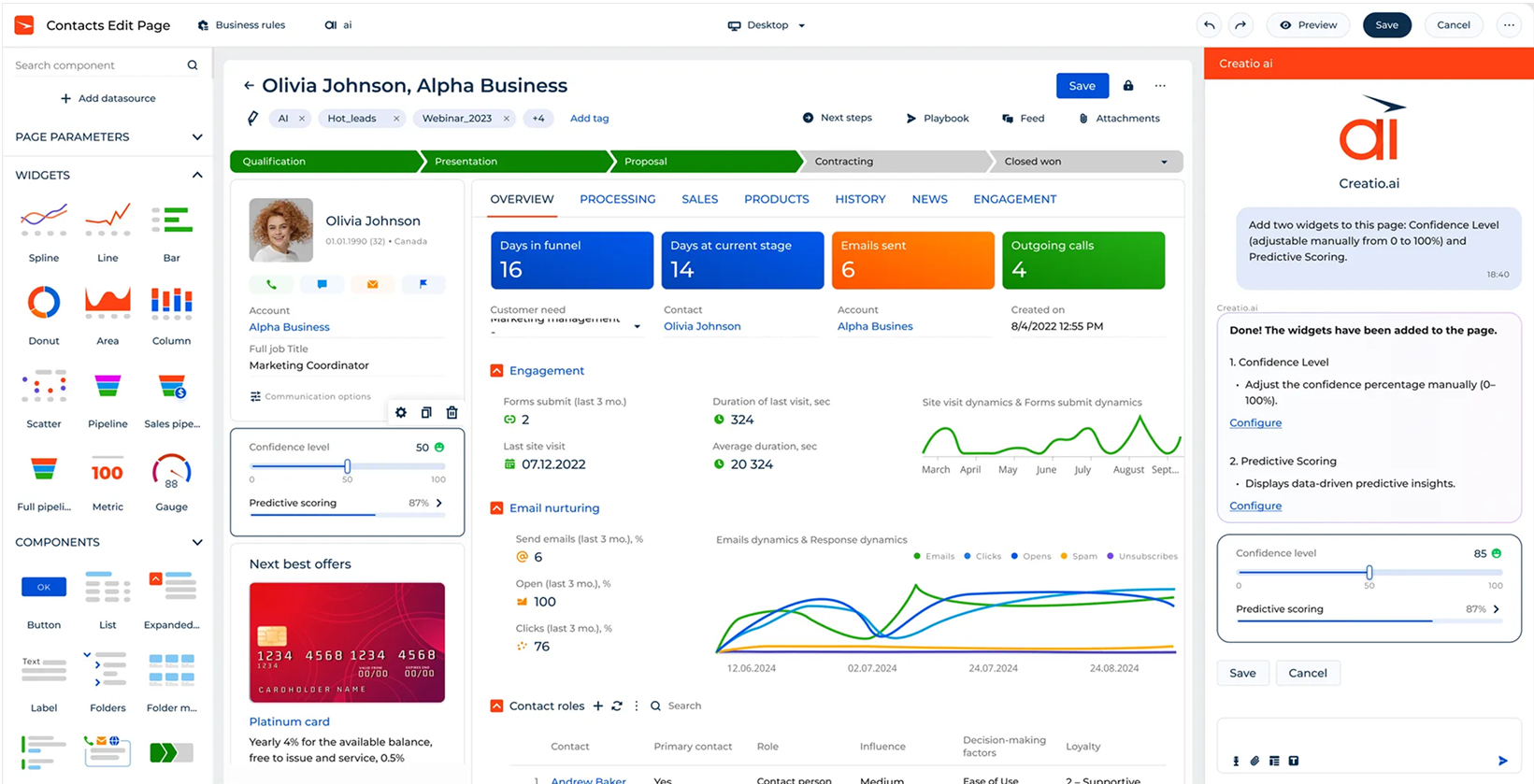
Creatio provides maximum flexibility through the AI-enhanced no-code development and composable architecture, allowing to customize everything from individual fields and dashboards to complete workflows and modules. The result is a powerful, fully adjusted CRM system that remains intuitive enough for fast adoption across multiple business units. Creatio’s CRM products are integrated on the unified AI-native no-code platform, and can be deployed as standalone solutions or bundled together to meet your exact needs:
- Creatio Marketing – A ready-to-use agentic platform for marketing experts to automate multichannel campaigns and accelerate lead-to-revenue cycle with AI and no-code at its core.
- Creatio Sales – An end-to-end agentic platform that enables sales professionals to manage end-to-end sales cycle and automate processes of any type with robust AI and no-code capabilities.
- Creatio Service – An omnichannel agentic platform for service teams to delight customers and drive service excellence enhanced by AI and no-code.
Creatio’s CRM products can be tailored to match your unique workflows and adapt seamlessly across multiple business units. It also provides 20+ pre-built industry workflows to help you maximize CRM functionality without investing resources in development.
In addition to extensive customization capabilities, the Creatio Marketplace offers hundreds of applications, add-ons and connectors to extend functionality and tailor the CRM even more precisely to your business needs.
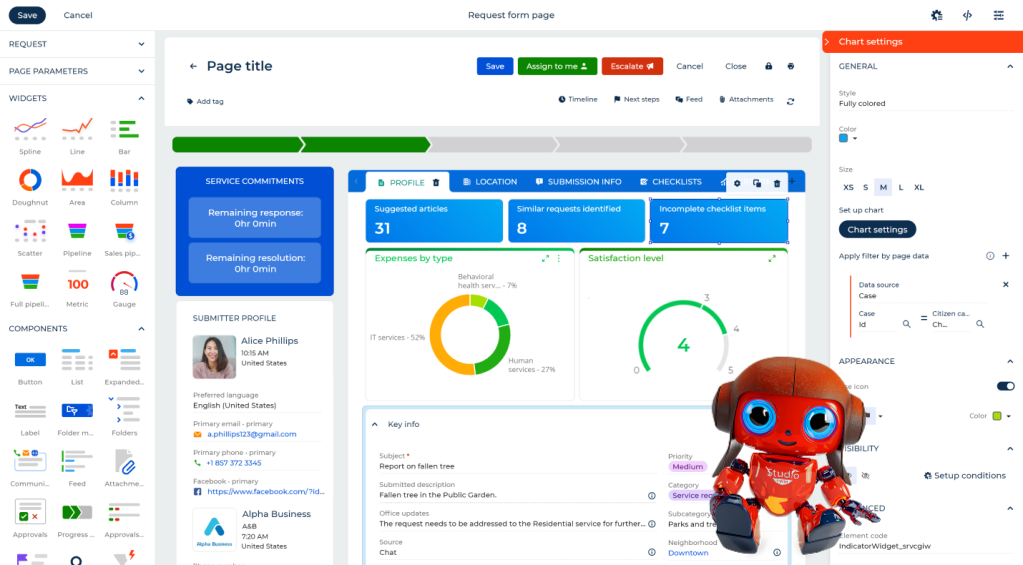
To extend CRM capabilities, Creatio features integrated AI agents — digital assistants that can work autonomously or support human teams across multiple business processes. In addition to out-of-the-box CRM agents for sales, marketing, and service, business users can design custom AI agents tailored to their workflows. For instance, users can build AI agents that flag suspicious transactions in banking, predict inventory shortages in manufacturing, or route patient inquiries in healthcare. Empowered by Creatio’s agentic AI capabilities, organizations can innovate faster and drive measurable growth.
Standout Creatio Features:
- Customizable CRM modules and automation for marketing, sales and service teams.
- 360-degree customer view consolidating key customer data, all touchpoints and interaction history.
- Advanced lead, account, contact, and opportunity management capabilities.
- Composable architecture to configure data models, UI, AI agents, and workflows.
- AI-assisted no-code development to create custom objects, extend standard models, and define complex dependencies with ease.
- No-code agent builder to design and tailor AI agents for specific workflows and processes.
- 20+ pre-built industry solutions and templates from Creatio and partners.
- Over 700 applications, connectors and integrations available through the Creatio Marketplace.
- Global and local readiness, with 28 languages supported out of the box and options for additional UI translations.
Potential Creatio Challenges:
- Creatio CRM may present a slight learning curve for business users with less experience in no-code.
Creatio Pricing:
Creatio offers a composable pricing model, which allows organizations to purchase only the modules and capabilities they need. Pre-built CRM modules start at $15 per user/month, while platform pricing starts from $25 per user/month.
A 14-day free trial is available to explore the platform’s functionality before committing.
2. Salesforce
You’ve probably heard about Salesforce before – it’s one of the most established solutions on the market with a long history of CRM development. Salesforce enhances industry automation, data management, and intelligence.
Its customization thrives on AI capabilities, empowering businesses to fine-tune and adapt as they evolve. This CRM optimizes outcomes, offers real-time insights, and fosters rapid growth. Moreover, the Lightning process and app builders offer extended customization, accompanied by strong integration possibilities.
Salesforce boasts an active development community, so you can further customize your CRM with programming and low-code tools.
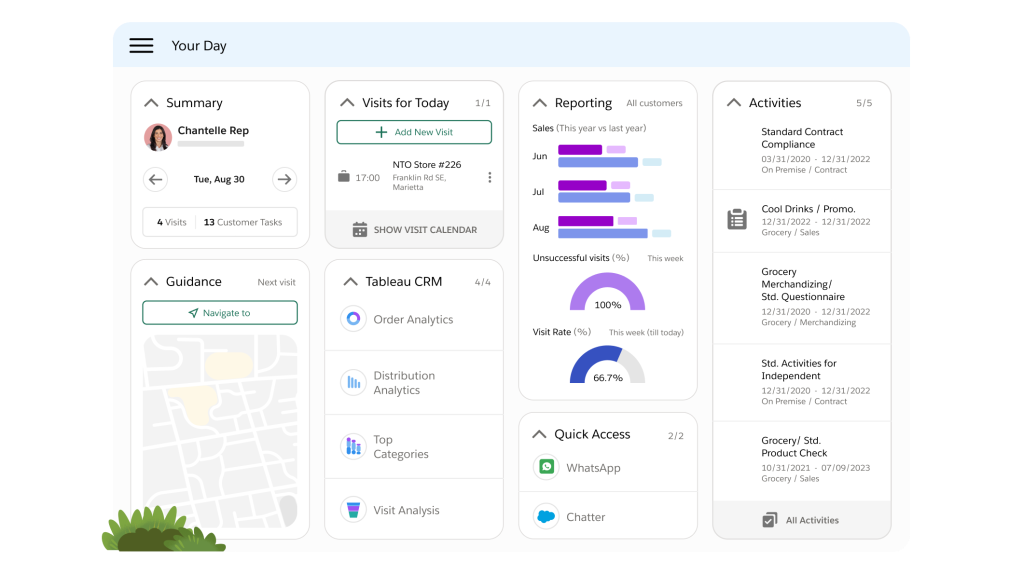
While Salesforce offers a lot of apps and tools within its ecosystem, centralizing all of the features you need in one platform can be quite challenging. In addition to that, Salesforce typically takes longer to set up due to its intricate operations, so if you’re looking for a solution with strong turn-key performance, consider a different provider.
Standout Salesforce Features:
- CRM suite covering sales, marketing, service and commerce.
- Einstein AI for delivering predictive insights and recommendations.
- Flow Builder for automation of processes like lead routing or case escalation.
- Industry-specific solutions such as Financial Services Cloud, Health Cloud, and Manufacturing Cloud with pre-configured features.
- Marketplace with pre-built integrations and partner apps.
Potential Salesforce Challenges:
- Customization mostly requires coding or technical expertise.
- Implementation and maintenance can be resource-intensive compared to other customizable CRMs.
Salesforce Pricing:
Salesforce Sales Cloud pricing starts at $100 per user per month for the Pro suite with basic customization capabilities and goes up to $550 user/mo for more advanced plan with built-in AI.
See also: Salesforce Alternatives & Competitors and Salesforce Marketing Cloud Alternatives & Competitors
3. Pipedrive
Pipedrive’s shining features are its customizable pipeline and user-friendly design.
With Pipedrive, your Sales team can effortlessly personalize deal stages, adjust closing probability percentages, and set deal indicators within the deal and pipeline modules. Furthermore, Pipedrive’s flexibility extends to data fields, email templates, and automation options, empowering every sales team to shape this CRM according to their unique needs.
The platform boasts strong usability ratings, excelling in customizing the interface and operating its diverse features. Users find it intuitive to personalize the platform's appearance and functionalities, allowing for seamless adaptation to specific workflows.
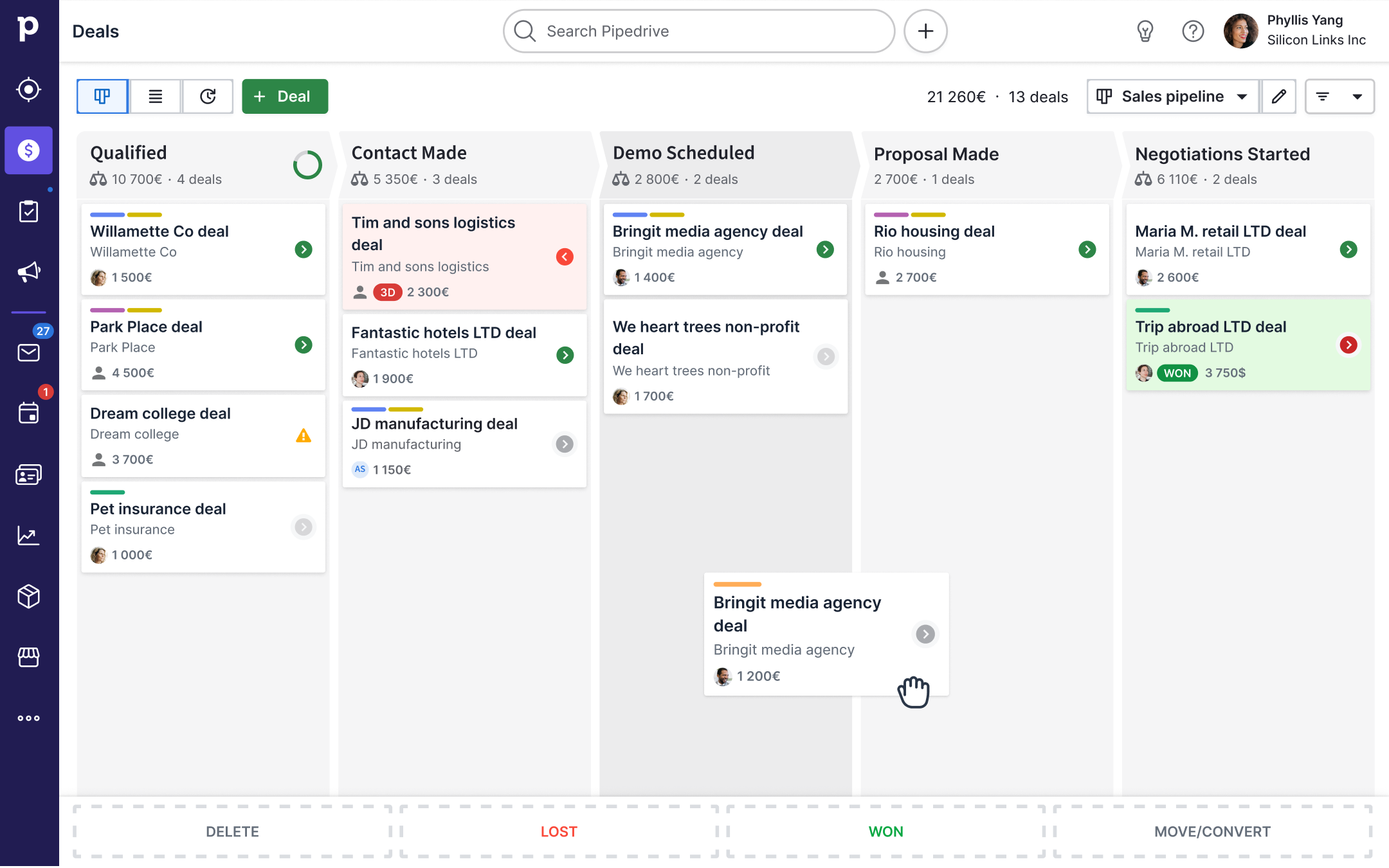
Moreover, the system offers a broad spectrum of tailoring options to craft detailed reports and dashboards. This extensive range empowers users to curate reports that precisely align with their analytical needs, from selecting specific metrics to presenting data through various visualizations.
Standout Pipedrive Features:
- Visual sales pipeline management with customizable stages.
- Custom fields and filters to adapt deal and contact records.
- Web forms to match your brand and collect specific lead information.
- Customized dashboards and reports to visualize sales performance, track key metrics, and filter data based on custom fields.
Potential Pipedrive Challenges:
- Not as strong for marketing or service compared to comprehensive CRM systems.
- Advanced customization requires higher-tier plans.
Pipedrive Pricing:
Pipedrive’s custom CRM features are provided starting Premium plan, priced at $65.
4. Monday.com
This CRM is notable for its simplicity – many reviews highlight how user-friendly it is.
The platform stands out for its use of spreadsheet data entry, integration of no-code automation tools, and effortless customization of boards and item fields. These functionalities cater to various sales processes or project requirements within sales operations.
The system's boards offer extensive customization options, serving as the fundamental pillars of a fully adaptable CRM. Moreover, Monday.com's accessible pricing structure extends CRM accessibility to users operating within budget constraints, making it more appealing to a broader audience.
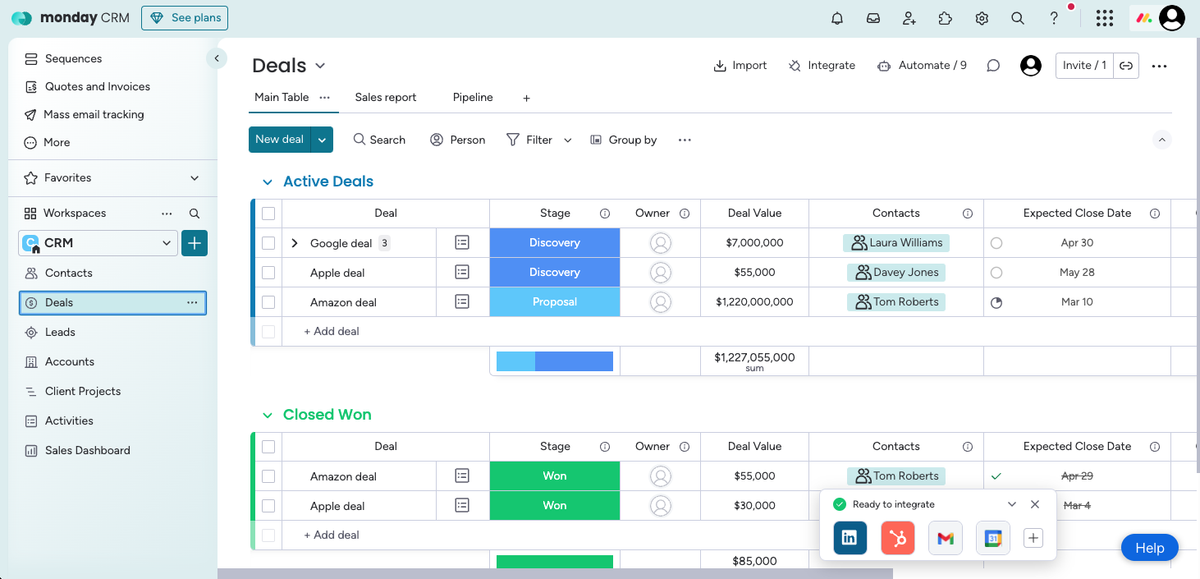
Standout Monday.com Features:
- Unlimited customizable pipelines for all plans.
- Templates for lead, contact and deal management.
- Configurable boards and columns to track workflows and the key data.
- Applications for Android and iOS.
Potential Monday.com Challenges:
- Limited number of dashboards for basic and standard plans, which might not cover midsize and large business’ needs.
- Learning how to customize the system may require more time to learn.
- Advanced custom CRM automations are locked in high-tier plans.
Monday.com Pricing:
The pricing starts at $33 for the plans that offer extensive customization capabilities.
5. Zendesk
Zendesk offers two adoptable solutions: Services and Sales, that can be integrated. The platform distinguishes itself through its utilization of spreadsheet data entry, integration of no-code automation tools, and the easy customization of boards and item fields. These features are tailored to accommodate diverse sales processes or project needs within sales operations.
The pipeline can also be changed based on your requirements and goals. As for analytics, its dashboards provide a wide array of customization choices, forming the foundation of a flexible CRM.
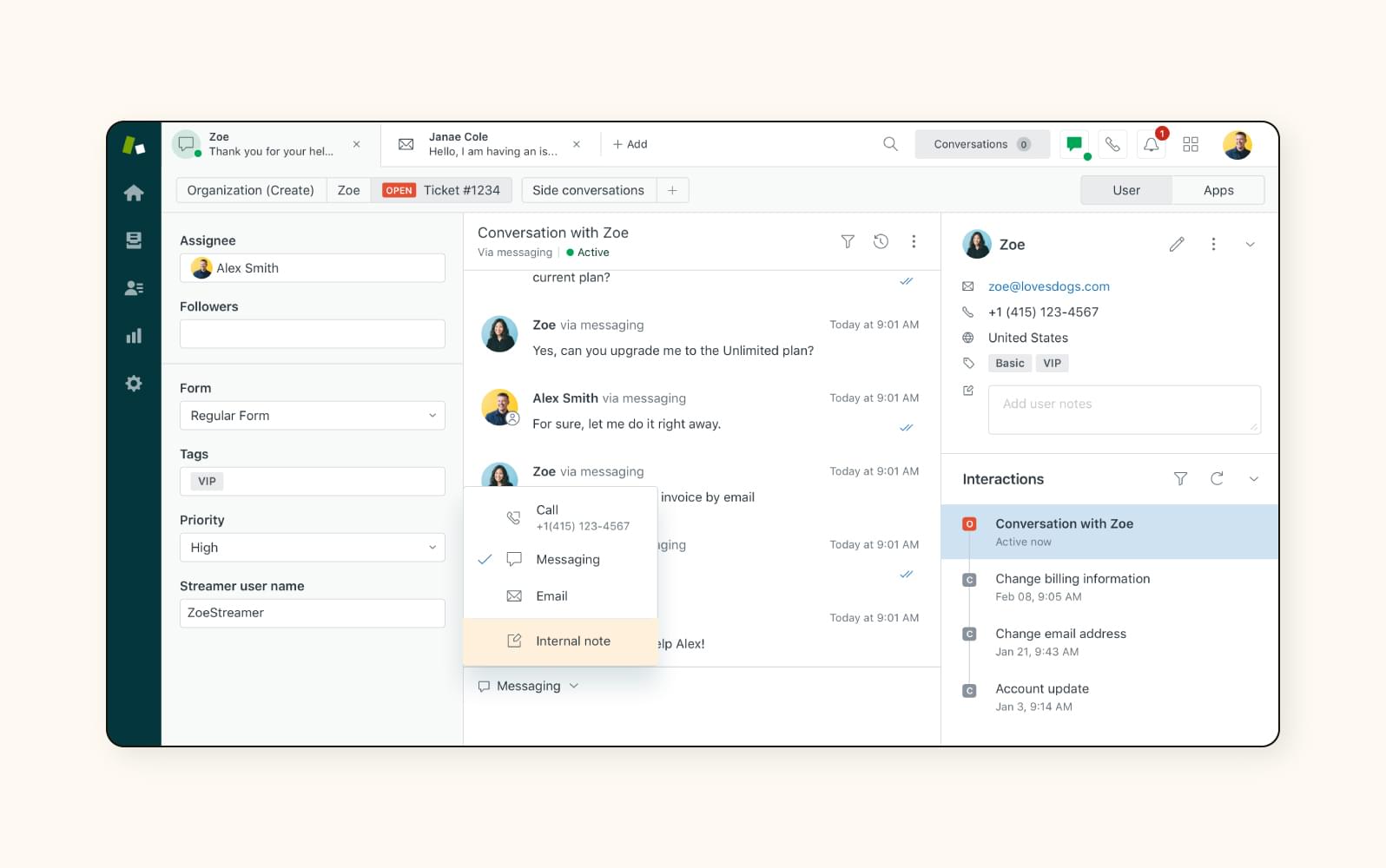
Standout Zendesk Features:
- Unified customer profile with cross-channel interaction history.
- Pre-built dashboards with customization options for multiple channels.
- Workflow automation and triggers for support and sales processes.
- Knowledge base functionality to share the key information across the business units.
- Configurable AI agent personas to support service teams and improve customer interactions.
Potential Zendesk Challenges:
- Primarily designed for customer service, with less depth in marketing and sales compared to broader CRMs.
- Steeper learning curve for advanced customization features.
- Limited industry-specific functionality.
Zendesk Pricing:
The plans that cover more advanced customization capabilities start at $110 per agent monthly.
6. Zoho CRM
Zoho is primarily an automation software that allows you to streamline various processes in your organization. Its CRM product, Zoho CRM is recommended for its customizability, scalability, powerful features, omnichannel communication tools, and robust integration options.
Unsurprisingly, Zoho CRM puts a lot of emphasis on streamlining different business processes, campaigns, and customer journeys. Thanks to its background, it also connects with over 500 apps via the Zoho Marketplace.
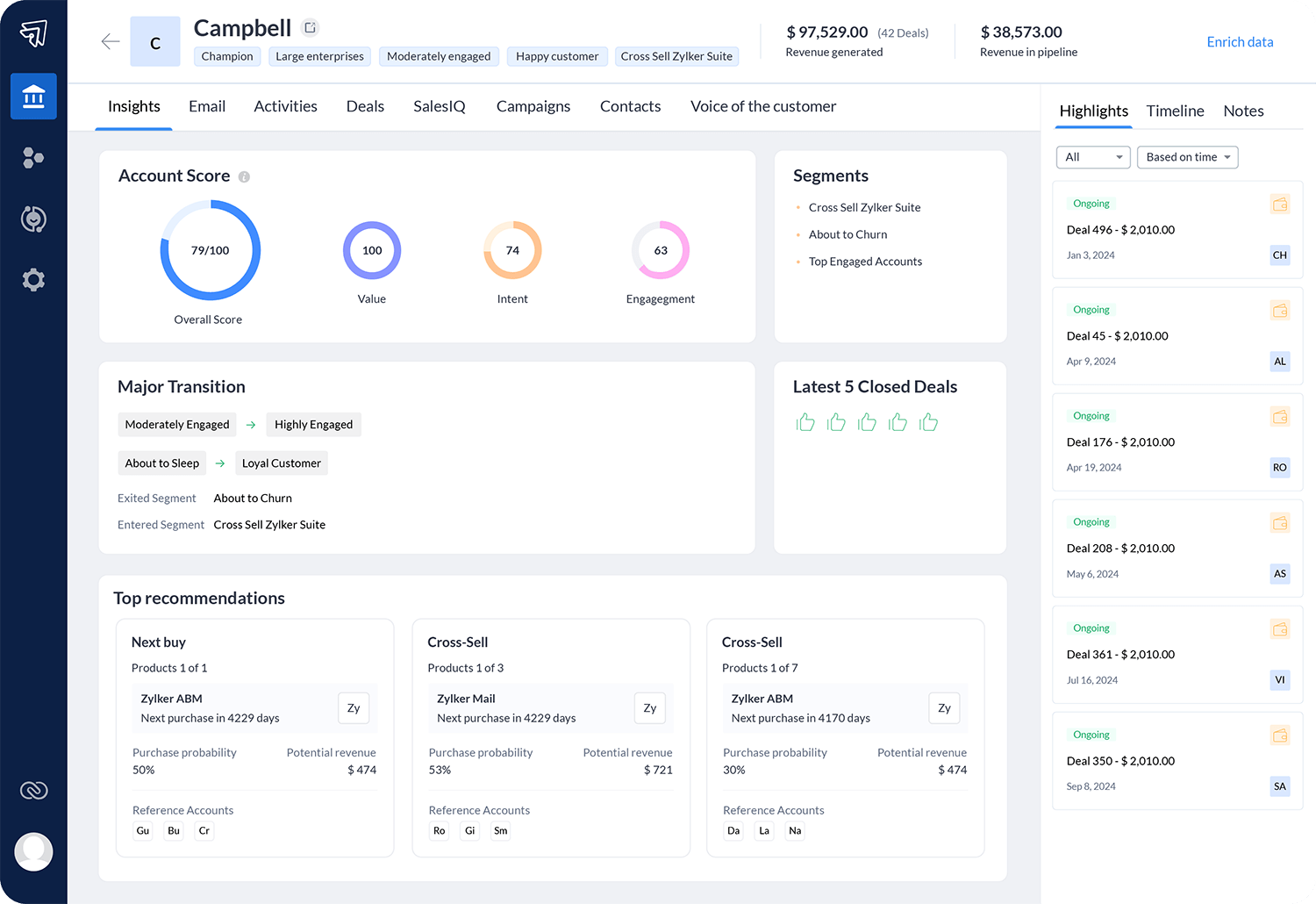
Standout Zoho CRM Features:
- Zia AI assistant to improve sales intelligence, forecasting and task automation.
- Prebuilt reports and AI-powered analytics, to provide insights into sales, marketing, and activity performance.
- A workflow automation tool called Blueprint, designed to map and enforce standardized business processes.
- Customizable modules, fields, layouts, and workflows to fit the business workflows and needs.
Potential Zoho CRM Challenges:
- Some capabilities are not integrated within its CRM platform, may require setting up a separate tool (for instance, Zoho Campaigns for email marketing).
- Building advanced custom reports may feel overwhelming, and require
- Many of its AI capabilities are locked behind high-tier plans.
Zoho CRM Pricing:
Zoho CRM has a free version, however, it’s understandably limited with its capacity and features. The paid plans start at $15 per user/month.
See also: Top 10 Zoho CRM Alternatives and Competitors
7. ClickUp
ClickUp, a cloud-based solution, is widely recognized for its prowess in project management and organizational capabilities. Beyond its primary functionalities, this system significantly aids businesses across industries in their CRM endeavors, offering exceedingly adaptable and tailored solutions.
The system's strength lies in its provision of customizable features, tags, and privacy settings, offering businesses extensive adaptability in crafting their CRM strategies and processes. Moreover, you are able to create distinctive task fields, enabling the management of various client information such as phone numbers, emails, notes, prospect details, and more.
Additionally, ClickUp stands out for its customizable communication and collaboration tools, allowing for tailored statuses, templates, workflows, task assignments, alerts, and an adaptable task toolbar.
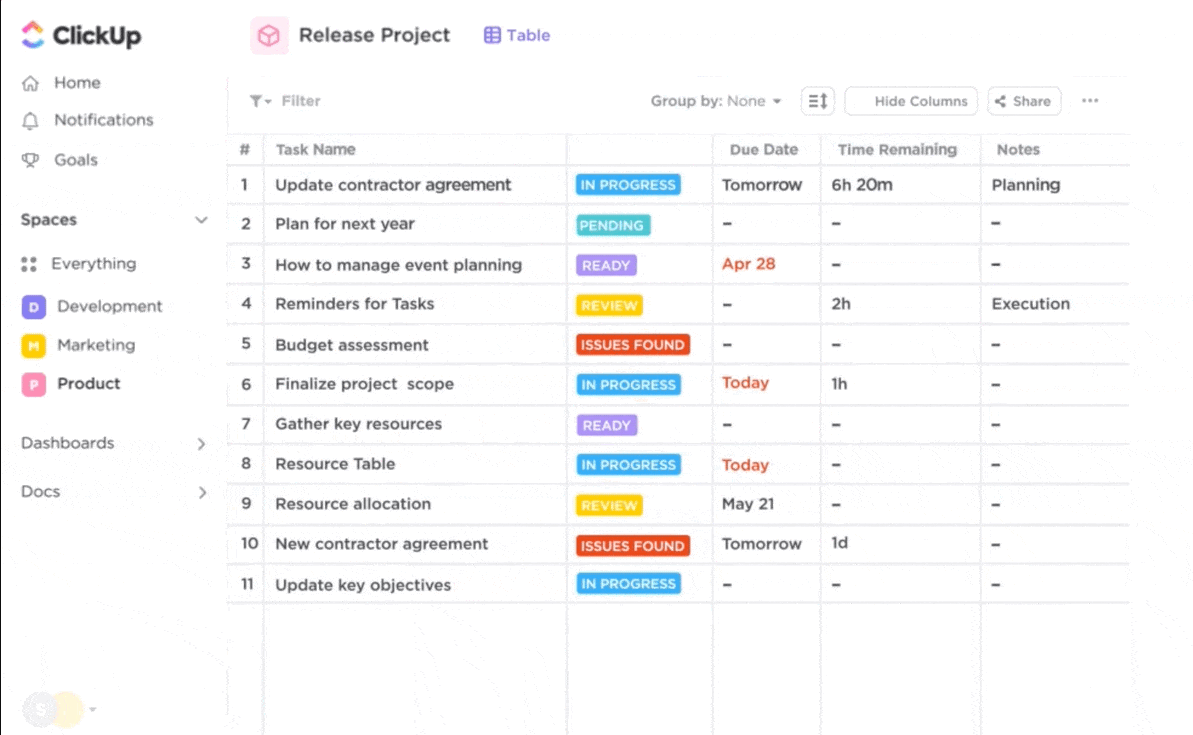
Standout ClickUp Features:
- Custom fields, statuses, and workflows that can be tailored to specific team needs.
- Configurable forms that centralize feedback, trigger workflows, and support AI-powered analysis.
- Pre-built and customizable templates for marketing, sales, and project management to accelerate setup.
- Integrations with more than 1,000 third-party applications.
Potential ClickUp Challenges:
- Many features are geared primarily toward project management rather than core CRM use cases.
- Lacks the depth of specialized CRM solutions, particularly for managing complex relationships and sales pipelines.
ClickUp Pricing:
The Business plan with more extensive configuration capabilities starts at $19 per user monthly.
8. Hubspot
Hubspot’s Customer Platform aims to battle the challenge of navigating vast amounts of data across marketing, sales, service, content, data and commerce fields. With these capabilities, businesses can utilize custom objects, properties, and associations to structure tailored data models. The platform provides users with the ability to set up deal pipelines, board views, index pages, record pages, and more.
Moreover, HubSpot allows you to create new UI elements that display custom information by building new custom extensions.
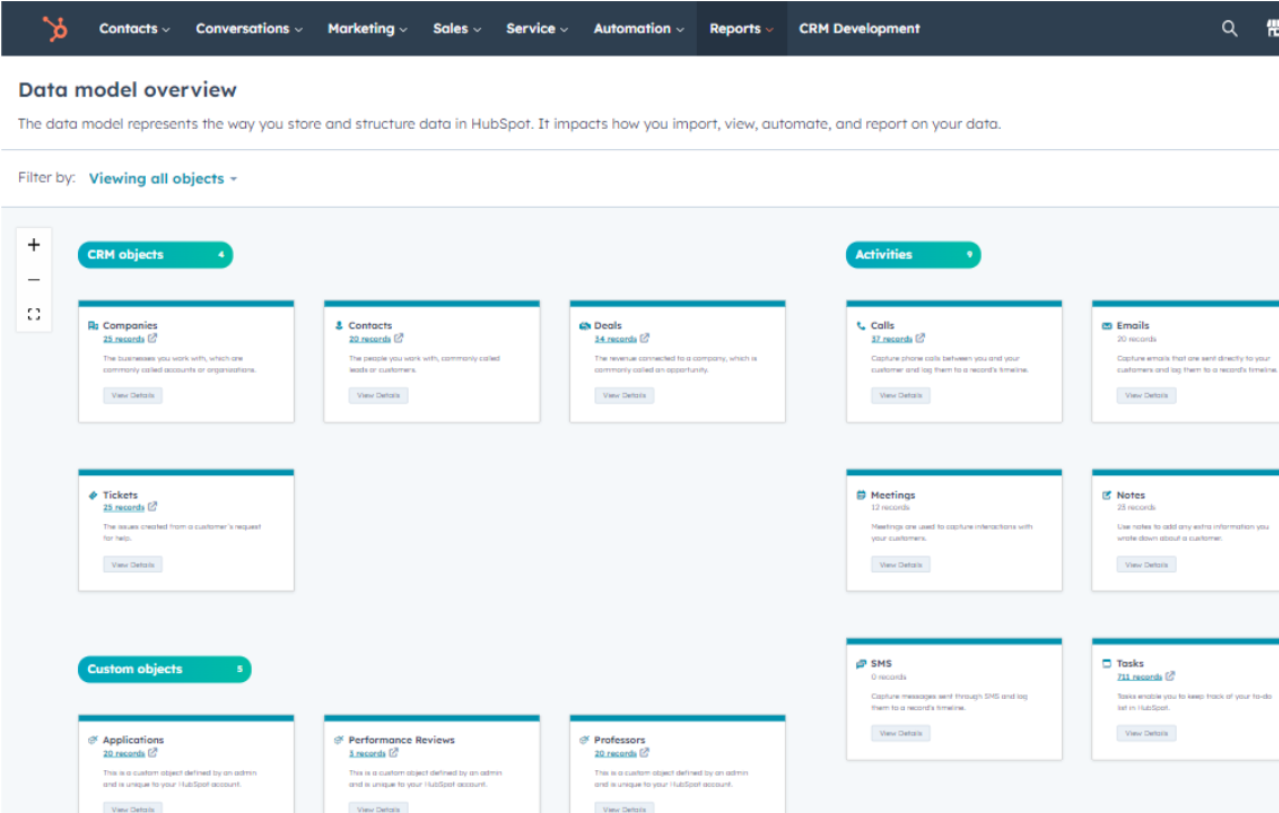
Standout Hubspot Features:
- Configurable CRM tabs and layouts to fit the business needs.
- Sales automation workflows to reduce manual tasks and improve pipeline efficiency.
- Default and custom forecasting and reporting tools.
- Custom field mappings to adapt the CRM to unique data structures.
- HubSpot’s AI-powered agent, called Breeze Customer Agent, for faster responses and support tasks.
Potential Hubspot Challenges:
- Costs can escalate quickly as businesses scale and require advanced features.
- Custom reporting, A/B testing, and advanced workflow automation are restricted to higher-tier plans.
Hubspot Pricing:
HubSpot’s Customer Platform supports core customization features in its Professional and Enterprise plans, the pricing starts at $1,450 for 6 seats per month.
See also: Top 10 HubSpot Alternatives & Competitors
9. Copper
Copper CRM stands out as a Google-centric system, tailored for users keen on integrating their preferred Google applications seamlessly. Specifically designed to harmonize a CRM with Google tools, Copper effortlessly integrates with Gmail, Contacts, Calendar, Sheets, and Drive, offering users a cohesive experience. Additionally, it provides a Chrome extension enabling teams to access the CRM interface directly from Gmail and Calendar.
This specialized software not only customizes CRM functionalities but also establishes a robust connection with Google applications. Its smooth integration with Google products and familiar interface bridges the gap for users seeking CRM solutions within the Google ecosystem.
Copper significantly simplifies the customization process for teams, allowing them to tailor data fields, workflows, templates, and pipelines to suit their unique requirements.
This is a great choice if your company heavily utilizes Google tools.
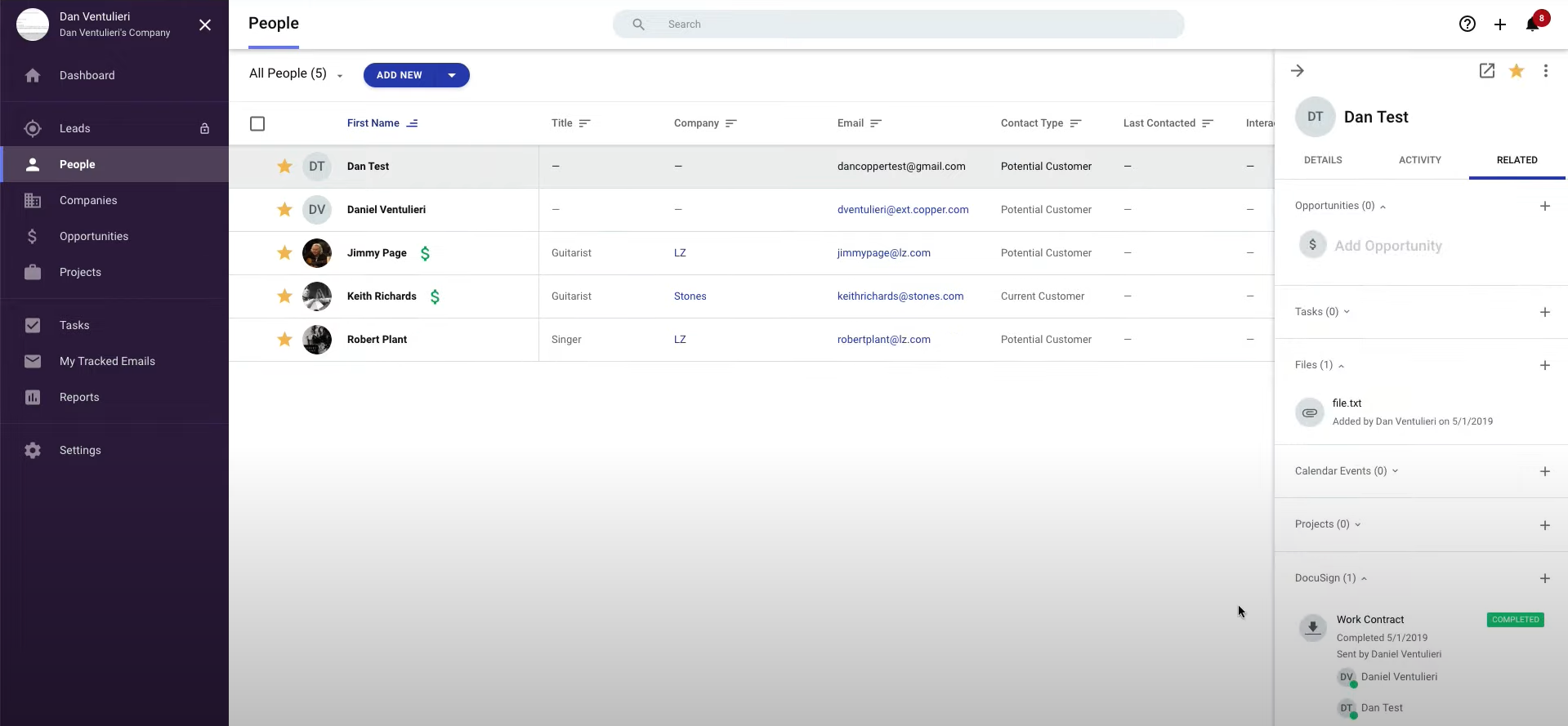
Standout Copper CRM Features:
- Customizable sales and project pipelines.
- Deep integration with Google Workspace apps such as Gmail, Calendar, and Drive.
- Activity, pipeline, and custom reporting (custom reports available only in Business plan).
- Support for custom fields to adapt data to unique processes.
- Team permissions and role-based access controls for Professional and Business plans.
Potential Copper CRM Challenges:
- Reporting functionality is limited compared to larger CRMs.
- Marketing capabilities are quite basic, making it less suited for end-to-end customer journey management.
Copper CRM Pricing:
Customization features are accessible through the Professional plan, priced at $69 per seat per month. Businesses that require larger customization may need to cosndier the Business plan, priced at $134 per seat per month.
10. Nimble
Nimble is an intuitive software solution offering extensive customization options within the CRM landscape. Its well-designed interface, navigation system, and an array of tools are crafted for quick adoption and effective utilization by users.
Customers find Nimble's customization capabilities allow them to tailor pipeline stages, data fields, automated workflows, and reports according to their specific requirements.
With a pronounced emphasis on deal tracking, lead management, and prospecting, Nimble caters to more conventional revenue operations. This software serves as a practical choice, especially for direct sales teams operating under unique sales processes or daily workflows.
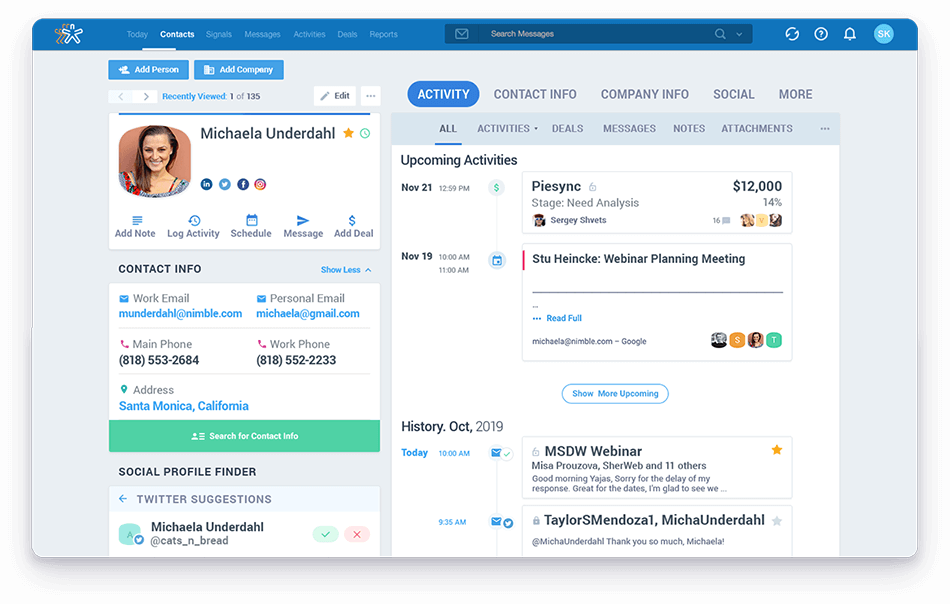
Standout Nimble Features:
- Automated profile data enrichment from social and business sources.
- Sales and marketing automation for email management and outreach.
- Custom workflows to automate repetitive tasks, such as lead assignment or follow-up reminders.
- Customizable web forms to capture leads directly from a website and track conversions.
- Integrations with a wide range of business applications, plus an API for custom connections.
Potential Nimble Challenges:
- Steeper learning curve for new users, with some features feeling more intricate than anticipated.
- Interface navigation can feel cumbersome, requiring extra effort to master.
Nimble Pricing:
Nimble offers a single subscription plan starting at $30 per user/month, with a free trial available to explore the platform’s features. The overall cost can increase depending on factors such as required storage and the level of customization or integrations implemented.
Summary
Customizable CRMs empower companies to tailor software to their unique processes, offering a more flexible alternative to rigid CRM systems. This CRM type is particularly valuable for midsize to large organizations, that often rely on industry-specific tools and complex workflows. In 2026, the most important configurable features are flexible data models, configurable dashboards, workflow automation, no-code tools, seamless integrations, and AI, which allows businesses to continuously improve performance across industries.
Creatio CRM delivers this freedom through its no-code platform, composable architecture, and AI integrated directly into the platform’s core. Business users can adapt fields, interfaces, and workflows, or even design custom AI agents to fit specific needs. This approach enables not only to streamline operations but also accelerate workflows and support sustainable business growth.





















































